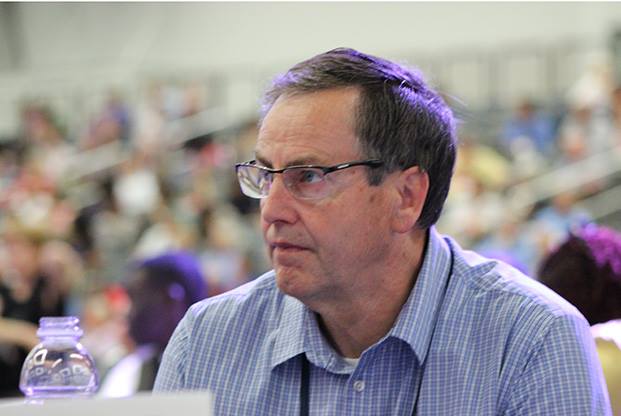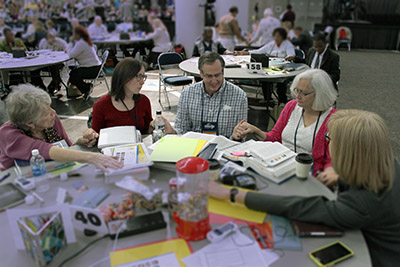
Role of reserve delegate at General Conference
 Rev. Roger Spahr served as the alternate clergy delegate for the Dakotas Conference at the 2016 General Conference in Portland. His role as an alternate provided an opportunity to observe and participate in the General Conference.
Rev. Roger Spahr served as the alternate clergy delegate for the Dakotas Conference at the 2016 General Conference in Portland. His role as an alternate provided an opportunity to observe and participate in the General Conference.
Photo: Rev. Roger Spahr listens to discussion while seated as a delegate during a plenary session at the 2016 General Conference in Portland. Photo by Dave Stucke, Dakotas Conference Communications.
The Dakotas Conference was allotted one clergy delegate and one lay delegate for the 2016 General Conference. The Book of Discipline states:
An additional number of Delegates (to be set by each respective Annual Conference, but less than the number of [Full] Delegates to The General Conference. These Delegates shall serve as Reserve Delegates to the General Conference and as [Full] Delegates to the Jurisdictional Conference.
Spahr spent the first week of General Conference observing the work of legislative committees. “Week one it is a little more difficult to get involved as an alternate delegate because you are not directly involved in the legislative committee process,” said Spahr.
The ten days of General Conference is intense. Often times delegates call on reserve delegates to “sit in” or be seated as the delegate during plenary sessions. Delegates must fill out an official request each time the reserve delegate is seated. Spahr has been seated as a delegate five times during the 2016 General Conference.
 The global nature of the church has become very evident to Spahr while in Portland. “The global of nature of the church is evident in everything that happens as General Conference worship and legislative work,” said Spahr. Photo: Roger Spahr, serving on the floor with the Dakotas and Minnesota delegations, prepares to join in prayer. Photo: David Stucke, Dakotas Conference UMC Communications.
The global nature of the church has become very evident to Spahr while in Portland. “The global of nature of the church is evident in everything that happens as General Conference worship and legislative work,” said Spahr. Photo: Roger Spahr, serving on the floor with the Dakotas and Minnesota delegations, prepares to join in prayer. Photo: David Stucke, Dakotas Conference UMC Communications.
The delegates at General Conference 2016 voted to accept the recommendation of the Council of Bishops to delay a debate on homosexuality at this gathering of the denomination’s top legislative assembly and let a proposed commission study church regulation.
Spahr sees the decision as challenging. "I think people are uncertain about what is going to take place,” he said. “By not taking a vote we set a direction in a sense. Some people view this as a victory, others a loss. There is a sense of distrust between groups of differing views.
In the Dakotas Conference the culture is highly relational from Spahr’s perspective. “The level of trust is different. We know each other and have relationships. This allows us to talk about things and get a sense of how we can work through differences.”
Clergy in the Dakotas Conference are invited to attend a debriefing session on May 31. The session will allow clergy to discuss the decisions made at General Conference.